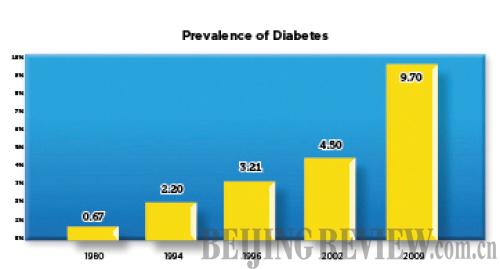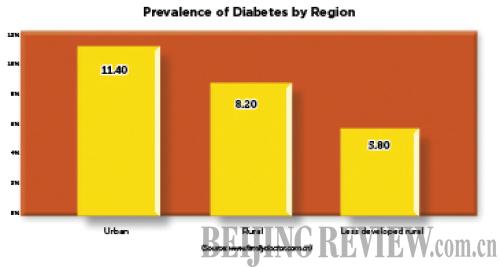|
As more farmers become wealthier during the shift toward urbanization, the prevalence of diabetes is also rising in rural areas. This creates a problem as the level of healthcare and people's awareness of what constitutes a healthy lifestyle is well below that of their urban counterparts.
"In China, the rural population makes up the majority of the workforce. The consequences of losing large parts of the workforce to diabetes and its complications would be catastrophic to the Chinese economy," Hang said.
Prevention network
Hang believes that the revelation that more than 100 million Chinese adults suffer from diabetes should put the prevention of chronic diseases at the top of the government's agenda. "It is not only a medical issue but a comprehensive one that is vital to the future of the nation's development," she said.
The prevention and treatment of diabetes gained national policy support on May 8, 2012, when the Central Government issued a five-year plan for the prevention and treatment of chronic diseases (2011-15). The plan is set to enable 50 percent of adults above the age of 35 to know their blood sugar levels, and to put 40 percent of diabetic patients under regular treatment by 2015. More than 80 percent of hospitals and health clinics in rural areas are expected to be able to conduct blood sugar monitoring by that time.
Non-governmental organizations have also joined in the ranks of diabetes prevention by advising people to lead a healthier lifestyle.
"It has been proven that intervention in people's lifestyle at an early stage is effective in preventing diabetes," Hang said, adding that the current urban community-based education programs on preventing diabetes should be expanded to children, adolescents, white-collar professionals as well as the rural population.
"The public is not aware of the damage brought by chronic illnesses. There should be a comprehensive network to effectively prevent and treat such diseases," Hang said.
In one way, Han, the retired worker in Beijing, is lucky not to have contracted any complications from her diabetes. She attributes this to strict self-control in pursuing a healthy lifestyle. "Besides keeping a diet, I have been sticking to an exercise routine since I was diagnosed as a diabetic 15 years ago and I have lost at least 10 kilos [in the process]," Han said.
Email us at: yaobin@bjreview.com


| 